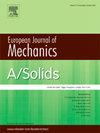Physics-Informed failure prediction in disordered systems sharing a common resource
IF 4.2
2区 工程技术
Q1 MECHANICS
引用次数: 0
Abstract
We study the progressive degradation of disordered systems that experience multiple intermediate failures and equilibrations before collapsing while sharing a common resource. The system is modelled using a generalized Fibre Bundle framework, wherein individual elements fail upon exceeding their local thresholds, and their load is redistributed among surviving elements according to a prescribed load-sharing scheme. We employ two classes of disorder distributions: the two-parameter Weibull and a more flexible custom distribution. To predict the ultimate tensile strength (UTS) and critical burst size which characterize system failure in this model—we employ Artificial Neural Networks (ANNs) informed by theoretical expressions rooted in statistical physics. Our investigation shows that the predictive performance of ANNs is significantly improved (from 83% to 99%) by our Physics informed theoretical predictors. This approach reduces the need for large-scale simulations and is a more efficient way to estimate the reliability of such complex disordered systems.
共享公共资源的无序系统中的物理信息故障预测
我们研究了无序系统在崩溃前经历多次中间失效和平衡的渐进退化,同时共享一个公共资源。该系统使用广义纤维束框架进行建模,其中单个元素在超过其局部阈值时失效,并且根据规定的负载共享方案,它们的负载在幸存的元素之间重新分配。我们采用两类无序分布:双参数威布尔分布和更灵活的自定义分布。为了预测该模型中表征系统失效的极限拉伸强度(UTS)和临界爆裂尺寸,我们采用了基于统计物理学理论表达式的人工神经网络(ann)。我们的研究表明,我们的物理理论预测器显著提高了人工神经网络的预测性能(从83%提高到99%)。该方法减少了对大规模模拟的需要,是一种更有效的估计复杂无序系统可靠性的方法。
本文章由计算机程序翻译,如有差异,请以英文原文为准。
求助全文
约1分钟内获得全文
求助全文
来源期刊
CiteScore
7.00
自引率
7.30%
发文量
275
审稿时长
48 days
期刊介绍:
The European Journal of Mechanics endash; A/Solids continues to publish articles in English in all areas of Solid Mechanics from the physical and mathematical basis to materials engineering, technological applications and methods of modern computational mechanics, both pure and applied research.

 求助内容:
求助内容: 应助结果提醒方式:
应助结果提醒方式:


